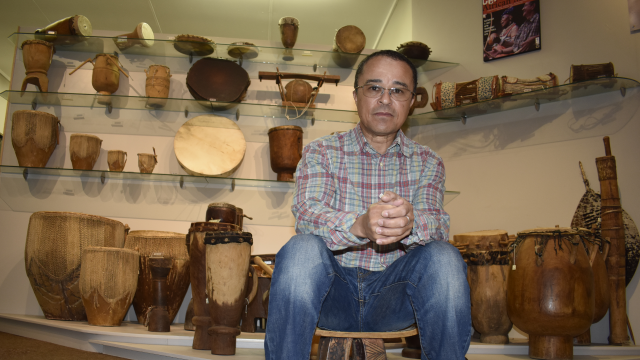
Thanks to esteemed project donors, the Rhodes University International Library of African Music (ILAM) is able to continue with its African music research projects, during a time when the cultural sector is being negatively impacted by the novel coronavirus pandemic.
National statistical and socio-economic research project, the South African Cultural Observatory (SACO) recently conducted an online survey of the impact of Covid-19 on cultural and creative industries businesses and freelancers, which received 600 responses.
“Some 15% experienced having an increase in demand for the goods or services they offer as a result of the Covid-19 crisis,” said Professor Jen Snowball, Professor of Economics at Rhodes University and Chief Research Strategist at SACO. “However, 94% of respondents reported having work that was scheduled for this year cancelled, and some are having to end short-term employment contracts and cancel contracts with suppliers. In addition to the intrinsic and social value of the sector that will be lost if these firms have to close, the mapping study also shows that there will be a significant negative impact on GDP and jobs.”
She added, “The cultural economy provides much in the way of public and economic good: it needs our support.”
In this bleak landscape for the performing arts, support for ILAM has continued and comes in the form of generous funding from the National Arts Council (NAC), the National Heritage Council (NHC) and the Swiss Arts Council (Pro Helvetia).
All that jazz in the Eastern Cape
The NAC, who has generously supported various Rhodes University projects for almost two decades, donated R1.2 million for a three-year jazz heritage research project.
“By focusing mainly on developing a rural creative or social economy in the Eastern Cape, this project will make a valuable contribution to our musical heritage and to transforming rural South Africa since it will provide employment to many veteran and novice musicians now and in the long term,” said Director of ILAM, Dr Lee Watkins.
Since 2009, ILAM has initiated and produced a reasonable number of outputs on the jazz heritage of Port Elizabeth, which resulted in performances, the production of a video, an exhibition at the Red Location Museum, workshops for younger musicians, an income for musicians, and at least two Masters degree theses.
“Since Port Elizabeth has been covered to a large degree, the new research is going to produce many more tangible outputs, which will be expanded to include interviews, concerts, theses, archival research, attempts at developing sustainability in the jazz heritage of the province, and workshops conducted by veteran musicians and cultural activists in Queenstown, King William’s Town and East London,” Dr Watkins explained.
The participants for the workshops will be veteran musicians, young musicians and learners from the community. Through the involvement of veteran musicians, participants will be made aware of their links with a rich cultural and historical past as they learn to perform the music that was spawned in the region.
“A great deal of the music was recorded on vinyl records which are fast deteriorating, while much of this music is also in the memory of veteran activists and musicians who are fast disappearing from the scene as a result of age, ill-health or death,” Dr Watkins explained. “This project will seek out these musicians and record their narratives and music as essential components to the historical documentation of the music history of the Eastern Cape.”
The results of this research will be added to the Arts and Culture curriculum of the Department of Education in the Eastern Cape, and form part of the curriculum at tertiary institutions in South Africa.
Cataloguing heritage music
The NHC, who has generously supported ILAM since 2012, has donated R100 000 for a heritage music cataloguing project.
The project will see ILAM’s music collection from the Keiskammahoek area divided into performances of song, dance, ritual, church music and interviews by three students and a heritage expert from the area will be responsible for ensuring quality control and metadata verification. This project is scheduled to run over four terms.
“We started collecting data from the Keiskammahoek area from around 2012 after the Ntinga Development Centre (NDC) approached ILAM for assistance in conducting research on the heritage of the area,” said Dr Watkins. “The NHC funding will allow us to increase the number of people and number of hours we can spend on the project.”
Catalogued items will become available through ILAM’s server, on an online and openly-accessible platform for the local community, and be augmented by members of the local community through their contributions
A virtual performance
For the second time since 2018, Pro-Helvetia has offered ILAM a grant of R29 000 as part of its ANT Mobility programme. The aim of this Pro-Helvetia programme is to develop relationships among performers in southern African countries. In 2020, the grant was awarded for ILAM to host renowned Angolan musician, Jorge Antonio Henriques. “Jorge arrived in South Africa just before lockdown, so all the plans we had originally have unfortunately been put on hold,” Dr Watkins explained.
However, an alternative programme is being developed which includes live streaming of a performance where Henriques is ‘virtually’ accompanied by renowned timbila performer from Mozambique, Venancio Mbande, who is currently a Masters degree student in the Rhodes University Music Department.
